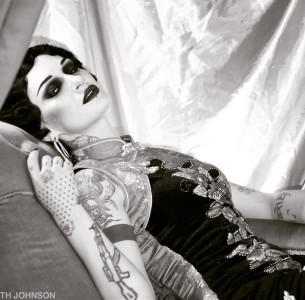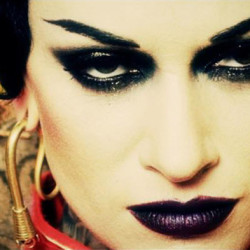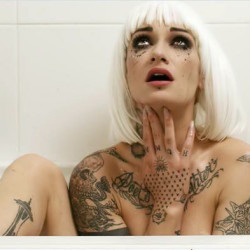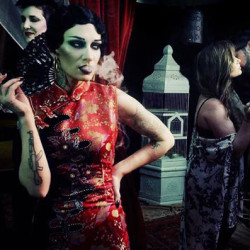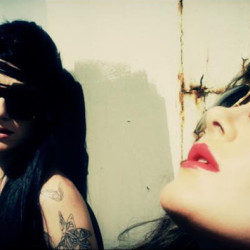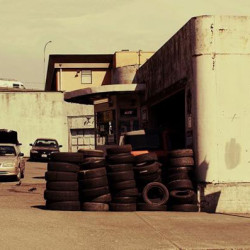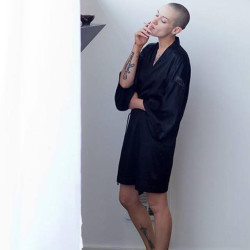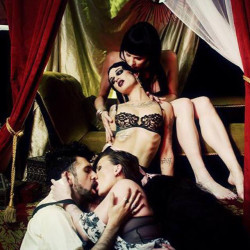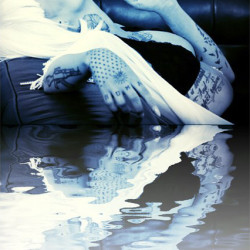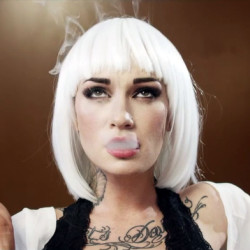I was born in Santa Barbara, CA and raised in a rich(er) suburb of the county, (Montecito) so that I would qualify to attend the public school there, which was reputed for its great teachers and academic aptitude. Both of my parents struggled financially to keep me there, as we were definitely not wealthy, yet living among some of the most monetarily endowed people in the world. This set up some sociological issues for me early on- issues that still crop up in both my music and activism from time to time. But the point of the struggle was a good education and I certainly had that.
After winning a full-ride scholarships to Cal Arts for musical theater at 12, I participated in a concert, performing an excerpt from Les Miserables (directed by the extraordinary Gloria Menedes). I’d never performed for such a large audience at that point and received my first standing ovation that night.
Q: Have you always been creative? Where do you get that from?
A: I would have been perfectly satisfied with that result. Iris A. Butler, wife of cinematographer Bill Butler, had been in the audience during the benefit and set out for two weeks to “find the girl that played Fantine”. I received a call from this woman asking me if I had ever considered acting for film and television. Concerned about pulling my own weight financially, (and guilty about having to ask for lunch money- which I knew was just an additional strain on my family) I decided to meet with her. The following week, I had signed a contract naming Butler as my manager and began getting submitted for castings and joined the Savage Agency.
Everything began happening really fast. Kinka Usher, film director (Mystery Men) and a friend, helped Taft Hartley me into the Screen Actors Guild and from there I began booking national commercials regularly. I’d sometimes have three or four auditions in Los Angeles a week, at that point. This made things increasingly difficult at school and created more stress for my family. The 90 mile trek to Los Angeles from Santa Barbara and back again began putting me behind in my school work and taking time and labor from my father, who dutifully drove me to every audition for a few years, without complaint. My manager decided the best course of action was to test out of high school with an equivalency exam and relocate to Los Angeles as soon as possible. So I did. I was 16 when I moved to Santa Monica with my then, best friend, Ferras Alqaisi.
I had already begun training privately with Vincent Chase ( a renowned film-acting coach and the last living studio teacher from MGM). Living in LA allowed me to begin training with him full time. Aware of my monetary constraints, he brokered a deal with my manager that if I faithfully attended every single class (five days a week- unless I had a job or audition)- I would not have to pay the monthly tuition. That kind of intense creative support really helped me feel not quite as alone as I was but eventually that aloneness caught up with me. Commercials were good pay and decent resume fodder but creatively they were about as anemic as it is possible to be as an actor. Being unionized so young, the only theatrical opportunities were from big-budget production houses, with intense competition for principal roles filled by an “unknown”. This was frustrating. I found a great deal of support in Mindy Marin (a casting director eager to push me along) but still, as close as I came to some good theatrical work, nothing was yielding.
As commercial work began to slow down and financial debts began building up, my desolation began to override any ambition. It was a painful juxtapose. It was at this time that I was spending a good deal of my time at the Chateau Marmont with family friend, Val Kilmer and his (somewhat sycophantic) entourage. Here again was the insidious echo of my experience growing up in Santa Barbara: surrounded by ostentatious wealth, fame and despondency – watching the best aspects of art and creation shrivel into the fleshy ugliness of the reality of being human. I began to (perhaps foolishly) take the subway some nights into the heart of downtown LA to observe the shitshow unfolding on the ground there. Insane poverty, homelessness, drugs, prostitutes, pimps- I watched all of this, wondering whether or not I would make it out and becoming increasingly agitated over the conditions of real people struggling to just survive. To occupy my time, I began volunteering with the IRC (International Rescue Committee) tutoring mostly Somali refugees in basic maths and english. I tried to hold out, but the creator in me was dying. I missed music. I missed writing. I missed independent projects that were more handshake than contract.
Q: What were the circumstances that planted that first creative spark in you, and how is that tied to your current inspirations? Were you encouraged early on by anyone in particular concerning your creative inspirations, family, friends, teachers or a mentor of some kind?
A: From conception I was surrounded by mentors- it was among the graces that kept me moving in this particular direction. My mother was a gifted and shy singer- I would catch her singing to herself in the kitchen or in the garden. I pretty much began singing by emulating my mother. As soon as I was reasonably sentient and had begun singing, people took notice of what I was doing and in whatever angelic way, helped usher me along the path. Family, lovers, teachers, managers, acting coaches, film directors, casting directors, other musicians, former band-mates, writers, poets and activists.
If I was forced to isolate one particularly driving force and mentor in my life, both creatively and existentially (which are not entirely separate), I’d have to credit my father, Charles S. Whitt. A poet, philosopher and former philosophy professor; he imbued in me the resolve not to live “the horrors of a half lived life” by defaulting into security over embracing the wonder and terror of attempting to create an entirely different narrative which values knowledge over comfort; beauty over resentment. He is among the finest poets to have ever lived and just happens to be both my father and my best friend.
Q: Where do you find your inspiration these days? How has it been nurtured by others and by yourself? How do you stay inspired?
A: Inspiration is plucked from the air; I find no lack of it. Yet because of the work I do occurs “in the dark and out of sight”, I am, for long periods, in total solitude with limited external input. This can be difficult because I’m thrust into that place of having to distinguish between what is founded and unfounded doubt. This is the deep ferment, the ‘dark night of the soul’, the negreto stage in alchemy – a place where everything appears to be in a state of total collapse. It is in this place that songs find me. If I have any “process” at all – somewhat begrudgingly, this is mine. It is a work of insane patience and trust. I am not in a sense writing songs- the songs are writing me.
Q: I’m currently reading a book, “Daily Rituals – How Artists Work”, which is a compilation of 161 creative minds describing how they maneuver the many obstacles and daily rituals to get done the work they love to do. Do you have daily rituals or disciplines that help you to successfully move forward with your creative endeavors?
A: There are all the classic things – as a vocalist, I try to keep my instrument warm. To create enough space in my mind to receive songs, I’ve found vipassana meditation and rock-climbing extremely useful. But really, at the risk of sounding trite- it’s all about repetition and joy. I need to write. If I allow these songs to remain un-extricated from my being, those once beautiful things become a malignant infection. Creations will contaminate their cradles, if not assisted in either being born or aborted. A hoarded creation is like a fucking time-bomb. NOT healthy. Art can be dangerous.
Q: Did you write Shanghai? What inspired this song? Can you tell us about the meaning, personal significance and intent of this piece. (Can you share the lyric sheet with us?)
A: Shanghai is the merely first original piece to be put into a cinema. It took years to come into total being- with all its limbs and features intact. I am insanely proud of her. As with a great deal of my music, I’ve tried to retain the highly personal aspects of these songs while keeping lyrics and visuals ambiguous enough to include the possibility of broader, subjective interpretation. “Shanghai” is cautionary, in part, but doesn’t deny the sumptuousness and intrigue of succumbing to the desire to feel better- even if “feeling better” ultimately results in a perceived “breakdown”. “Breakdowns” are the avenue by which illumination is able to find us. I don’t mean to directly promote Bacchanalian methods in order to force some kind of wisdom- but there is some truth to holding fast through the night in order to see another morning; a philosophy more akin to Aristotle and Saint Thérèse of Lisieux than Aleister Crowley.
Shanghai
Huma Kali – “Shanghai”, the Official Music Video
Produced by Huma Kali and Joseph Seuferling
Directed, Photographed and Edited by Joseph Seuferling
Produced by Psionic Broadcast for Entropy International Media
Production, Engineering, Guitar: Timothy Klusken (aka TeKay)
Lyrics, Vocals, Guitar by Huma Kali
©2015 H. Kali / J. Seuferling
Stay in for the night; it doesn’t have to hurt
You look like you’ve never lost your way before
So tell me what’s wrong with you?
That’s why
But its alright
Finally
Finally you’ve made your mind
Yea it’s raw but you’ll love the taste
Give it a try, you’ll swing on
Swing on shanghai
Swing on Shanghai
I’ve seen you for what you are
and I know why (why you come to me)
You’ve got what you want but is it what you need?
You better choose wisely babe
Once its done, no, it don’t come back
Its alright
Finally, Finally
You’ve made your mind
Yea it’s raw but you’ll love the taste
You’ll give it a try
You’ll swing on Shanghai
Swing on shanghai …
Q: How have your creative collaborations with others helped in achieving your creative goals?
A: This is really a profoundly potent fuel, collaborations. I have been incredibly blessed to have crossed stars with some of the most incredible creative conspirators. They’ve their own brilliant burdens – and in this way, by lending form to ideas, a vessel for traumas– the resulting catharsis of these kinds of synergistic compatibilities are life-altering.
Q: I see you covered Sam Cooke, how did you come to choose this song? Are there other musical inspirations you anticipate covering in the future?
A: Covers, standards, folk-songs – whatever they might be called- carry with them a unique importance. They’re deeply rooted in the history of people and time- and are always a communal transmittance. Pages may be burned or crumble to dust. Even markings on stone will eventually fade away but the ancient tradition of relaying histories and timeless human conditions through song; that is, from lip to ear is a grand one- and a part of every culture worth the title.
A Change Is Gonna Come (Sam Cooke cover)
Entropy International Media presents Southern Gothic chanteuse Huma Kali and her evocative cover of the Sam Cooke classic.
Lead & Background Vocals: Huma Kali
Production and Engineering: TeKay
“A Change is Gonna Come” was a track I’d been listening to often (usually book-ended by the likes of Odetta and Bessie Smith). While being somewhat incapacitated by a string of dental surgeries, I began binging on sedentary media: hours of Ken Burns epic Civil War documentary, listening to news reports on the hate-slaughters in South Carolina and elsewhere, reading my families history through the trail of tears into Oklahoma reservations, the hysterical debates about the confederate flag and the unfathomable frequency of deaths by the hands of so-called “peace officers”. This all caused me to seriously consider the reality that although the civil war can be marked in a high-school textbook as having an official end-date, the civil war, has, in a sense, never really ended. It has been forcibly removed from the first-glance consciousness of a privileged and willingly ignorant population. The legacy of trauma wrought upon so many didn’t cease with abolition. Nor with the civil rights movement. Nor with the LA riots. Nor Katrina or Ferguson. The issues that began this bloody history still smolder ominously beneath the surface of our daily experience. I felt that “A Change Is Gonna Come” was a potent, timely reminder of this fact. So I chose to cover it. There will be more covers in future but at the moment, I’m completely occupied with bringing my originals to term.
Q: How do you sustain passion and drive in accomplishing your best in creative endeavors?
A: Fear 😉
Q: Do you have idols? Muses? Who do you admire?
A: Idols? No. Muses? Absolutely – but I could write a tome on them alone, so I’ll just leave that there. I admire people who, despite the enormity of their own sufferings – and the suffering of the world at large– still endeavor to help ease the sufferings of others. I admire people that risk their lives to inform and educate – people that risk vilification and judgment in order to tell the truth. I admire people who are willing to find beauty in the worst of circumstances. I admire the mad ones.
Q: What are the obstacles an artist in your position face and struggle with, and how do you overcome them?
A: Damn, I guess crippling self-doubt has been a relatively constant feature. With that and everything else that seems threatening during the “process”, I essentially try to reinforce my understanding of the innate pattern of creation: “Breakdown. Illumination. Transcendence.” This can sometimes help me “see in the dark”.
Q: What makes you happiest?
A: Being of service – “baptismal” tears (tears of compassion, tears of love, joy, or immensity) – “little deaths”- changing my mind… These things make me sublimely happy.
Q: How important is audience to you?
A: After the work and craft of sculpting these songs, performing them is quite different. At that point, the goal is not creation but conveyance. An audience provides a very real transmission of energy that is resplendent, transcendental and deeply gratifying. I can’t adequately convey the sensations that gut me when I see tears in the eyes of strangers- moved by these works that have allowed me a similar catharsis, but it is miraculous and terribly beautiful. Audience has never been the goal, but that they are there is an indescribable honor.
Q: Why Seattle?
A: My experiences in Los Angeles had become obviously depressing. But I became hopeful and thoroughly uplifted by news from my manager that I had been requested on “short-list” to read for a role starring opposite Nicolas Cage in the film “The Matchstick Men”. There were only three actors being considered for the role, of which I was one. I loved the script and threw myself into the task of giving breath to that character. After auditioning before the producers and director, the prognosis was good. I waited by my landline phone in my shitty Hollywood apartment waiting to hear from my manager. She called announcing that I should allow myself to be excited ; she was receiving excellent feedback, she’d said. For fifteen minutes, I was able to imagine being finally extricated from the static situation I’d found myself in. I was elated. When she finally called again, her voice was uncharacteristically restrained. One of the producers had voiced a concern that I wouldn’t be able to “play young”. After some debate about which direction they desired to go in for the supporting lead, they’d opted to go for the more nubile interpretation offered by Alison Lohman. I thought she did an excellent job executing the role. Yet while I understood the creative politics of the decision, I was emotionally crushed. It was, in a sense, the straw that broke the camels back.
My mother had had plans of moving to Washington state for work – and with rent I couldn’t pay for looming in fore of my consciousness and almost no emotional support or family around me to “talk me off the ledge” so to speak, I made the decision to join her in late 2005. In 2006 I began working on behalf of Save the Children, trying to funnel all of my sociological frustrations and creative passions into the field of activism, fundraising and volunteering. I’d only sporadically had “normal” jobs before. I tried ardently to push away every remnant of artistic ambition from my consciousness. In this, I was successful for many years- but I wasn’t creating, so in a sense, I was self-destructing. I tried to distract myself from myself by directing my focus into planning a wedding with my then fiancé. That completely fell apart and I fell apart with it. Nothing was working. I was not on my path. At that point, I’d no idea where my path was. In an attempt to grieve all of this, I traded an electric guitar I’d had (which was essentially a piece of furniture, gathering dust) for a cheap acoustic guitar. I was so “choked-up” with grief that singing was an impossibility- my throat simply couldn’t contain that gravity- so I began the mammoth task of attempting to teach myself guitar. This was perhaps one of the best decisions I had ever made. The genesis of my debut single “Shanghai” had begun its journey into being at that time. My voice came back. I was writing again. I was singing again- and this time, in Seattle, my adopted home-town- it was ALL on my own terms. If I made an executive or creative decision, it was all on me. I had no master. I had never found myself in the position of having this kind of freedom before. The muses came flocking to my throat, guiding my hands- and finally, I was healing. While activism is always an aspect of my work- being an artist is a spiritual obligation. If I am not creating, I’d rather not be alive- and that is the harsh truth of it, really… If I’m to live, I must be creating. I finally learned to accept that this was what I was supposed to be doing. I just needed to be completely shattered to come to that realization.
Q: What’s in your future?
A: Who can truly answer that question? I do know this, however: wherever the future happens to be, I’ll be there.
Q: Do you have other original songs or videos currently in the works or slated for the future?
A: Oh yes, yes and yes… Shanghai was a taste of what is to come. There are many seeds in the soil- with of course original solo works, I’ve been collaborating further with TeKay (Timothy Klusken; Entropy International audio producer and sound engineer), some upcoming film and visual music projects with Joseph Seuferling (director of Shanghai) and I am excited about a long-overdue collaboration with Mark Scarboro. Exciting things. Impassioned things…
Q: What was it like working with Joseph Seuferling on the “Shanghai” video single? Can we expect more?
A: Meeting Joseph has been one of the great serendipitous events of my life. Our visions synergize with such perfect symmetry-was apparent in a result like “Shanghai”. Joseph is an incredible film director, cinematographer, master editor. He is able to transform challenging ideas into coherent forms without insulting the intelligence of an audience. Which is fucking rare. I have worked with some wonderful directors in my life but none so promising, so committed, so bafflingly talented. It helps, perhaps, that we are both broken and mad in our way. Joseph is one to keep an eye out for. When he hits, there can be no doubt that his rise will be anything but meteoric.
Joseph and I are already working on carving out more cinematic deliciousness for you– more music videos, a feature-length film. Inasmuch as I want to gush over details- I’m sworn to secrecy, which is the keynote of our modus. It’s almost agonizingly exciting. Keep an eye out. The debut of “Shanghai” is truly, just the beginning.
© 2015 MIROIR Magazine interview by Jo David



